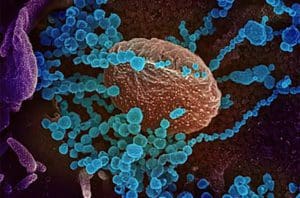
This colorized scanning electron microscope image shows SARS-CoV-2 (round blue objects), the virus that causes COVID-19, emerging from the surface of cells cultured in the lab. [Image courtesy of National Institute of Allergy and Infectious Diseases]
Now, the mutation has appeared spontaneously in a portion of viral samples from Kent, Bristol and Liverpool in the U.K.
The trend is the latest evidence that the E484K mutation provides an evolutionary advantage for the novel coronavirus and that several COVID-19 variants have a similar evolutionary trajectory.
Researchers from South Africa have concluded that the E484K mutation results in a substantial reduction in the efficacy of antibodies in convalescent plasma samples. Seattle-based researchers reached similar conclusions in a preprint related to SARS-CoV-2 mutations.

The original U.K. variant B.1.1.7 originally lacked the E484K mutation found in the South Africa B.1.351 and Brazil P.1 variants. Image courtesy of Moderna.
The U.K., South Africa and Brazil variants also share a mutation known as N501Y that could improve how the viral spike protein attaches to human cells. Fortunately, the N501Y mutation seems to influence vaccine performance less than E484K.
Moderna (NSDQ:MRNA) and Novavax (NASDAQ:NVAX) have already begun developing custom versions of their vaccines for the South Africa variant.
A growing amount of data suggest that currently available vaccines are effective against strains with the E484K mutation, albeit with reduced efficacy. The Novavax vaccine, for instance, was almost 90% effective in a Phase 3 U.K. trial when the dominant B.1.1.7 variant lacked the E484K mutation. That vaccine’s efficacy was 60% in South Africa, where the majority of SARS-CoV-2 viruses have the E484K mutation.
Filed Under: Infectious Disease





Tell Us What You Think!
You must be logged in to post a comment.